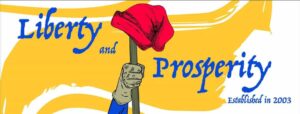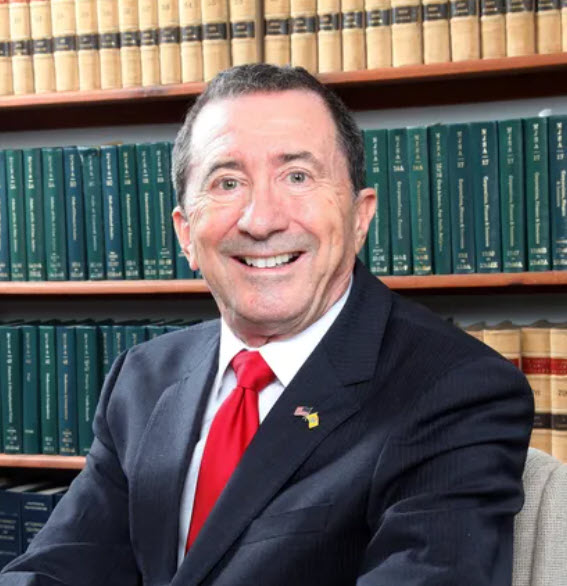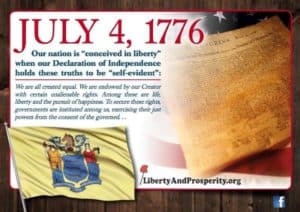
We read these “sentiments” of our Declaration of Independence at the beginning of our breakfast discussions every Saturday morning. We invite you to pick up a few of these postcards and give them to your friends, family, neighbors, and co-workers–especially the younger ones. You can pick them up from the plastic bin on the air conditioning unit in the parking lot behind our office at 453 Shore Road, in Somers Point, NJ. Take what you want, but please use what you take. We can also mail these cards to you if you send us a stamped, self-addressed envelope. Thanks!
On July 4, 1776 our Declaration of Independence was published, and read to the American people for the first time. When copies reached the Continental Army camped outside of Boston, George Washington immediately had it read to each of his soldiers.
Years later, Abraham Lincoln repeatedly explained that our nation was created by these “sentiments” of our Declaration of Independence.
“We hold these truths to be self-evident, that we are all created equal. We are endowed by our Creator with certain unalienable rights. That among these are Life, Liberty, and the pursuit of Happiness. That to secure these rights, Governments are instituted among us, deriving their just powers from the consent of the governed. That whenever any Form of Government becomes destructive of these ends, it is the Right of the People to alter or abolish it, and to institute new Government. . . “
During February of 1861, Abraham Lincoln took a train from his home in Illinois to be inaugurated that March in Washington, D.C. On George Washington’s birthday, February 22, 1861, Lincoln had his train stop in Philadelphia, Pennsylvania, so could make these remarks at Independence Hall:
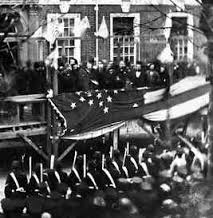
“I have never had a feeling politically that did not spring from the sentiments embodied in the Declaration of Independence. I have often pondered over the dangers which were incurred by the men who assembled here, and framed and adopted that Declaration of Independence. I have pondered over the toils that were endured by the officers and soldiers of the army who achieved that Independence. I have often inquired of myself what great principle or idea it was that kept this Confederacy so long together. It was not the mere matter of the separation of the Colonies from the motherland; but that sentiment in the Declaration of Independence which gave liberty, not alone to the people of this country, but, I hope, to the world, for all future time. It was that which gave promise that in due time the weight would be lifted from the shoulders of all men. This is the sentiment embodied in that Declaration of Independence”.
In 1858, Abraham Lincoln ran for U.S. Senate in Illinois as a Republican. He was defeated by incumbent Democrat Senator Stephen Douglas after seven famous debates.
Democrats attacked Lincoln for opposing slavery during those debates. Lincoln said he wanted to end slavery in Washington, D.C. and in territories that had not yet become states. Democrats claimed that Lincoln was a dangerous, anti-American radical. Democrats said that Lincoln, by opposing slavery, was opposing the U.S. Constitution of 1787 which permitted slavery.
Lincoln responded to those attacks just over a year later, when he was invited to speak at Cooper Union College in New York City. Before speaking, Lincoln spent months examining votes, letters, and speeches by each of the 39 “Founding Fathers”, the men who drafted and agreed to the U.S. Constitution in 1787.
Lincoln’s “Cooper Union Speech” of 1860 was widely reported and it electrified the nation. Lincoln explained how his research proved that 21 to 23 of the 39 signers of the Constitution, a clear majority, voted to ban slavery in American territories that had not yet become states. Lincoln documented that this majority, which included southern slaveowners George Washington and Thomas Jefferson did this because they wanted to eventually end slavery in America. In that Cooper Union Speech, Lincoln argued that by opposing slavery, Republicans were preserving the values that created America in 1776. He accused southern Democrats of attacking those values by fighting to expand and prolong slavery.
After Abraham Lincoln was elected President in 1860, eleven of the fifteen Democrat slave states in the south voted to leave the United States. On April 12, 1861, South Carolina began the Civil War. On that day, its state militia to fired cannons at federal soldiers stationed at Fort Sumter, outside of Charleston harbor. President Lincoln and Congress responded by raising an army to occupy the southern states and end the rebellion. However, the Union Army was defeated and driven back at Bull Run (Manassas), Virginia in July 1861.
During July of 1862, President Lincoln announced his intention to free all slaves in the eleven rebel states. (Neither Lincoln nor Congress could free slaves in the other four slave states without amending the Constitution.) As Commander in Chief, Lincoln could “seize and confiscate the property of rebels”. On July 17, 1862, Congress passed a law specifically allowing the President to exercise that power.
However, Lincoln did not issue his Emancipation Proclamation right away. Lincoln’s advisers urged him to wait until Union soldiers won a significant victory. Union forces won a major victory at Antietam (Sharpsburg), Maryland on September 17, 1862. Five days later, Lincoln issued his first Emancipation Proclamation. It said that if the eleven rebellious slave states did not end their rebellion by January 1, 1863, all slaves in those states would be “forever free”.
On July 3, 1863, Union forces decisively defeated the Confederate Army at Gettysburg, Pennsylvania. On July 4, Confederate forces surrendered at Vicksburg, Mississippi. During November of that year, President Lincoln spoke at Gettysburg to dedicate a cemetery for union soldiers who were killed in that battle. Lincoln specifically referred to how America was “conceived in liberty” through the Declaration of Independence “four score and seven” (87) years earlier on July 4, 1776.
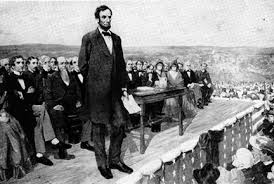
Four score and seven years ago our fathers brought forth upon this continent, a new nation, conceived in Liberty, and dedicated to the proposition that all men are created equal.
Now we are engaged in a great civil war, testing whether that nation, or any nation so conceived and so dedicated, can long endure. We are met on a great battle-field of that war. We have come to dedicate a portion of that field, as a final resting place for those who here gave their lives that that nation might live. It is altogether fitting and proper that we should do this.
But, in a larger sense, we can not dedicate—we can not consecrate—we can not hallow—this ground. The brave men, living and dead, who struggled here, have consecrated it, far above our poor power to add or detract. The world will little note, nor long remember what we say here, but it can never forget what they did here. It is for us the living, rather, to be dedicated here to the unfinished work which they who fought here have thus far so nobly advanced. It is rather for us to be here dedicated to the great task remaining before us—that from these honored dead we take increased devotion to that cause for which they gave the last full measure of devotion—that we here highly resolve that these dead shall not have died in vain—that this nation, under God, shall have a new birth of freedom—and that government of the people, by the people, for the people, shall not perish from the earth.
Abraham Lincoln won re-election in November of 1864. On March 4, 1865, he gave this Second Inaugural Address in front of the Capitol. Here, Lincoln again explained how he believed America was built on the “sentiments” of our Declaration of Independence. However, he spoke of our Civil War as the “true and just” punishment of God for allowing the “offense” of “American slavery” to continue past “His appointed time”.
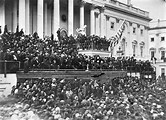
“On the occasion corresponding to this four years ago all thoughts were anxiously directed to an impending civil war. . ..
“One eighth of the whole population were colored slaves not distributed generally over the union but localized in the southern part of it. These slaves constituted a peculiar and powerful interest. All knew that this interest was somehow the cause of the war. To strengthen perpetuate and extend this interest was the object for which the insurgents would rend the Union even by war while the government claimed no right to do more than to restrict the territorial enlargement of it. Neither party expected for the war the magnitude or the duration which it has already attained. Neither anticipated that the cause of the conflict might cease with or even before the conflict itself should cease. Each looked for an easier triumph and a result less fundamental and astounding. Both read the same Bible and pray to the same God and each invokes His aid against the other. It may seem strange that any men should dare to ask a just God’s assistance in wringing their bread from the sweat of other men’s faces but let us judge not that we be not judged. The prayers of both could not be answered ~ that of neither has been answered fully. The Almighty has His own purposes. “Woe unto the world because of offenses for it must needs be that offenses come but woe to that man by whom the offense cometh.” If we shall suppose that American slavery is one of those offenses which in the providence of God must needs come but which having continued through His appointed time He now wills to remove and that He gives to both North and South this terrible war as the woe due to those by whom the offense came shall we discern therein any departure from those divine attributes which the believers in a living God always ascribe to Him. Fondly do we hope ~ fervently do we pray ~ that this mighty scourge of war may speedily pass away. Yet, if God wills that it continue until all the wealth piled by the bondsman’s two hundred and fifty years of unrequited toil shall be sunk and until every drop of blood drawn with the lash shall be paid by another drawn with the sword as was said three thousand years ago so still it must be said ‘the judgments of the Lord are true and righteous altogether.’”
We are a group of roughly 200 citizens who mostly live near Atlantic City, New Jersey. We volunteer our time and money to maintain this website. We do our best to post accurate information. However, we admit we make mistakes from time to time. If you see any mistakes or inaccurate, misleading, outdated, or incomplete information in this or any of our posts, please let us know. We will do our best to correct the problem as soon as possible.
Also, because Facebook, Twitter, and other social media platforms falsely claim our posts violate their “community standards”, they greatly restrict, “throttle back” or “shadow ban” our posts. Please help us overcome that by sharing our posts wherever you can, as often as you can. Please click the social share links below. Also copy and paste the link to the “comments” section of your favorite sites like Patch.com or PressofAtlanticCity.com and email them to your friends. Thanks.
Seth Grossman, Executive Director
LibertyAndProsperity.com
(609) 927-7333
